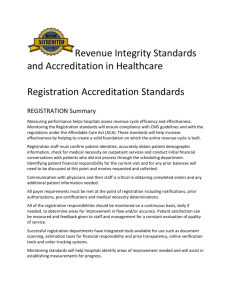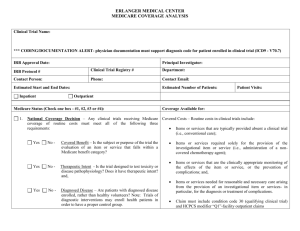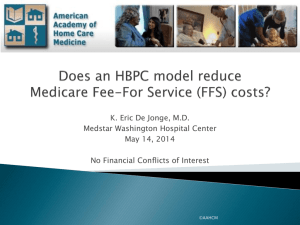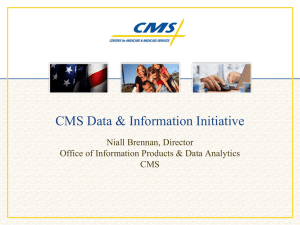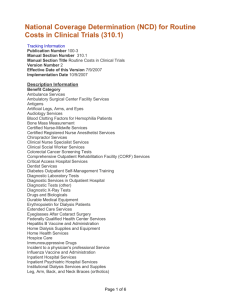Potential Impact of Healthcare Reform Legislation on
advertisement
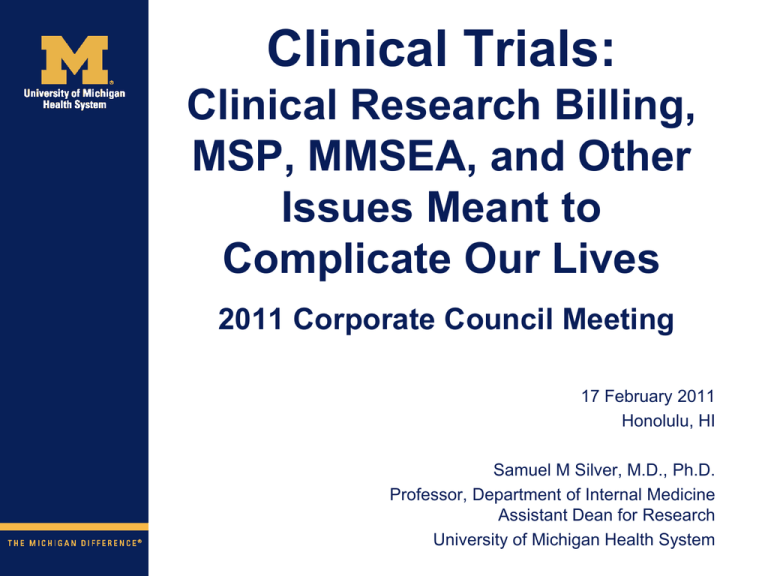
Clinical Trials: Clinical Research Billing, MSP, MMSEA, and Other Issues Meant to Complicate Our Lives 2011 Corporate Council Meeting 17 February 2011 Honolulu, HI Samuel M Silver, M.D., Ph.D. Professor, Department of Internal Medicine Assistant Dean for Research University of Michigan Health System Topic Overview • Medicare & Clinical Research Billing • Healthcare Reform & Clinical Trials • Medicare Secondary Payer Issues • MMSEA and Clinical Trials • The increasing complexity of TPAs and self-funded companies 2 The Current Landscape: State Laws 34 States and the District of Columbia Have Clinical Trials Coverage Laws or Agreements, Although Specifics Vary from State to State 3 The Current Landscape: Federal Laws • Presidential Executive Memorandum for Medicare, 2000 • Medicare, Medicaid and State Children’s Health Insurance Program Extension Act (MMSEA), 2007 • Patient Protection and Affordable Care Act (PPACA), 2010 4 Executive Memorandum • President Clinton signed an executive memorandum on June 7, 2000 directing the Secretary of Health and Human Services to “explicitly authorize (Medicare) payment for routine patient care costs. . .and costs due to medical complications associated with participation in clinical trials”. Source: CMS Transmittal AB-00-89 5 Overarching Goals of the Medicare NCD • Allow Medicare beneficiaries to participate in research studies • Encourage research that adds to the knowledge base regarding Medicare population • Allow Medicare beneficiaries to receive care that may have a health benefit 6 Covered Routine Costs • All items and services that are otherwise generally available to Medicare beneficiaries, including: – Those provided absent a clinical trial (e.g., conventional care) – Those required solely for the provision of the investigational item or service (e.g., administration of a non-covered chemotherapeutic agent) – Those required for clinically appropriate monitoring of effects of investigational item or service, or prevention of complications – Those needed for reasonable and necessary care, for diagnosis or treatment of complications 7 What is Not Covered According to the NCD… “Routine costs of a clinical trial include all items and services that are otherwise generally available to Medicare beneficiaries (i.e., there exists a benefit category, it is not statutorily excluded, and there is not a national non-coverage decision) that are provided in either the experimental or the control arms of a clinical trial except: • The investigational item or service, itself unless otherwise covered outside of the clinical trial; • Items and services provided solely to satisfy data collection and analysis needs and that are not used in the direct clinical management of the patient (e.g., monthly CT scans for a condition usually requiring only a single scan); and • Items and services customarily provided by the research sponsors free of charge for any enrollee in the trial.” Source: CMS. NCD for Routine Costs in Clinical Trials (310.1). 8 Patient Protection and Affordable Care Act (PPACA) Clinical Trials Provision (H.R. 3590, Sec. 2709) Signed into law in 2010 Will be effective in 2014 Regulations Pending Court Challenges 9 PPACA: Clinical Trials Coverage • Coverage required for routine costs of clinical trials • Does not require insurer to cover experimental product or data collection required solely for the trial • Does not preempt state law if more protective 10 PPACA is Not a Panacea for Clinical Trials Coverage • The PPACA legislation does not include the following: – Items and services required for the provision of the investigational item (e.g., administration of the noncovered chemotherapy drug); – Items and services required for the clinically appropriate monitoring of the effects of the item or service, or the prevention of complications; – Items and services that are medically necessary for the diagnosis and treatment of complications arising from the provision of an investigational item or service. 11 PPACA is Not a Panacea for Clinical Trials Coverage • “Grandfathered plans” – Clinical Trial coverage provisions will not affect employer-based insurance health plans currently in effect as of March 23, 2010. 12 Patient Protection and Affordable Care Act and Grandfathering (Not just the huge multistate companies): The University of Michigan believes the University of Michigan Group Health Plan is a “grandfathered health plan” under the Patient Protection and Affordable Care Act (the Affordable Care Act). As permitted by the Affordable Care Act, a grandfathered health plan can preserve certain basic health coverage that was already in effect when that law was enacted. Being a grandfathered health plan means that your plan may not include certain consumer protections of the Affordable Care Act that apply to other plans… 13 What is the Medicare as Secondary Payer (MSP) rule? Private Insurance 1. Clinical Trial 2. Unanticipated Serious Subject Injury 3. Who Pays ??? Sponsor Medicare 14 CMS MSP Position • CMS’s current position is that if a private sponsor of a clinical trial agrees to cover any costs of subject injuries that were denied by third party payers then the sponsor has made a commitment to be the primary payer. MSP laws are clear that Medicare is always the secondary payer. Medicaid laws confirm that Medicaid is always the payer of last resort. 15 Contract Language with MSP Issues • ". . .Wonder Biotech will pay reasonable and appropriate medical and hospital expenses for the treatment of adverse events, where the claim is denied by the study subject's insurance, which occur to Study subjects as direct result of the proper administration of Study drug, or proper performance of research procedures specifically required by the Protocol . . . ." 16 MSP and Routine Care • Recently CMS has extended their MSP guidance beyond the costs of research related injuries to the topic of routine care. CMS states that if the research sponsor agrees to pay routine care costs when there is no expectation of payment from any other source and without regard to the beneficiary’s ability to pay, then Medicare cannot pay and the beneficiary cannot be charged for the services. CMS views this scenario as one where there is no legal obligation for the patient to pay and therefore Medicare cannot reimburse for the services. 17 Subject Injuries in a Trial: Section 111 of the MMSEA • The liability carrier, including a clinical sponsor who is liable for injuries, is required to report one time payments and ongoing liability for Medicare beneficiaries. 18 19 Language from An Insurance Plan from a Self-Funded Company • The term “Experimental” when used in reference to a drug, device, treatment and/or procedure…satisfies..the following: a drug, device, treatment or procedure which Reliable Evidence shows is the subject of an on-going Phase I, II, or III clinical trial or is under study to determine its maximum tolerated dose, its toxicity, its safety, or its efficacy as compared with a standard means of treatment or diagnosis… 20

